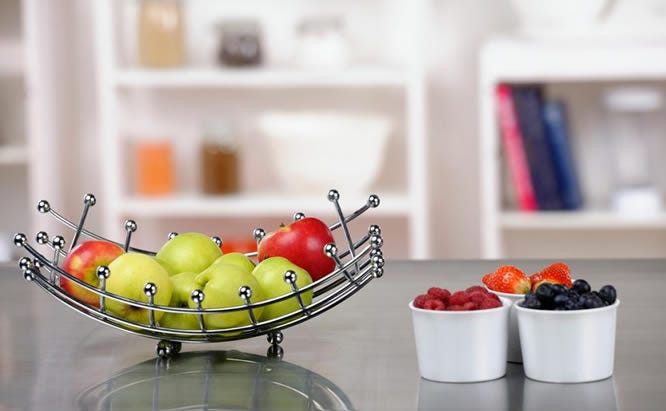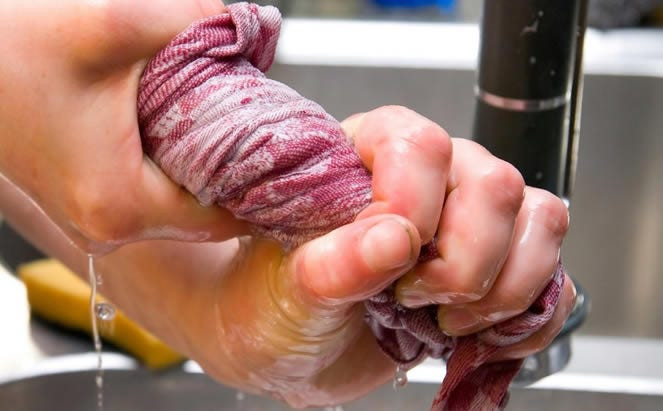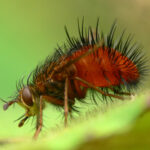Are you battling fruit flies and wondering if cold weather will send them packing? Understanding the behavior of these tiny pests, especially their response to temperature, is crucial for effective control. At flyermedia.net, we delve into the science behind fruit flies and their environment, offering insights to help you manage these unwanted guests, ensuring a comfortable, fly-free environment. Learn about fly control, preventive methods, and the latest research on fruit fly habits.
1. What Attracts Fruit Flies?
Fruit flies are undeniably drawn to the sweet aroma of ripe or fermenting fruits and vegetables, making kitchens a prime target. However, their tastes extend beyond the obvious; they are also attracted to sugary drinks and even alcohol.
These pests don’t limit their attraction to just food items. Surprisingly, they can be drawn to non-food items like cleaning supplies. Damp mops, moist cleaning rags, and buckets of wastewater may also attract fruit flies. Their ability to thrive and lay eggs in even the thinnest layer of fermenting material means maintaining extreme cleanliness is essential to keep them away.
2. Can Fruit Flies Make You Sick?
Unfortunately, fruit flies can easily pick up filth and contaminants from the objects they land on, especially since many of their favorite food items are found in our waste receptacles.
Even worse, their larvae, which develop in the fermenting fruit they prefer to eat, can cause stomach distress or illness when unintentionally consumed by people. These larvae can also transfer contaminants from their parents’ breeding site to fruits and vegetables, so it’s essential to keep them away from your food.
 Fruit Bowl
Fruit Bowl
Alt Text: A fruit bowl filled with various fruits, attracting fruit flies, which can be prevented with proper storage and cleanliness.
3. Where Do Fruit Flies Lay Eggs?
Fruits and vegetables are the primary places where adult fruit flies lay their eggs. However, the produce needs to be overripe or rotting. They won’t try to burrow into food that is not yet fermenting. Once conditions are right, the adult fruit fly breaches the outer portion of the fruit or vegetable and deposits eggs inside.
Overripe produce is not the only place where fruit flies can lay their eggs, though. Look for small accumulations of sludge that fruit flies can utilize for laying eggs. This sludge is best described as a goopy solution of debris and liquid that collects in the bottom of trash cans, inside garbage disposals, inside plumbing, and in the seams of appliances. Even a small amount of sludge can host a few fruit fly eggs.
4. Can Fruit Flies Live in Drains?
Fruit flies eagerly live and breed inside drains, where they can often find the food and moisture they need. Though it may seem like they would get washed away whenever you run your faucet, they often survive this flood of water.
Also, be aware that the bugs you think are fruit flies may actually be drain flies, so determine what you are dealing with before taking further action. Get rid of drain flies, which look more like tiny, fuzzy moths with suitable products.
5. Do Fruit Flies Die in the Winter?
So, Do Fruit Flies Like The Cold? Let’s find out. Winter weather doesn’t necessarily kill off fruit fly populations. After all, winter in many areas can be quite warm. However, cold temperatures will stunt the development of new generations of fruit flies.
Scientists have found that at 60°F, the lifespan of fruit flies decreases. When the temperatures fall below 53°F, these flies stop developing entirely.
Still, adult fruit flies have the ability to “overwinter” when conditions get too extreme for them. This allows a fruit fly population to survive frigid temperatures and start the next generation when favorable conditions return. This overwintering, or diapause, is a fascinating adaptation that allows them to persist through unfavorable conditions.
5.1. Impact of Temperature on Fruit Fly Development
The relationship between temperature and fruit fly development is well-documented. According to research from Embry-Riddle Aeronautical University in July 2025, temperature significantly affects their life cycle. At lower temperatures, their development slows down considerably, and they may even enter a state of dormancy.
| Temperature (°F) | Impact on Fruit Flies |
|---|---|
| Below 53 | Development stops entirely. |
| 60 | Lifespan decreases. |
| Optimal (70-80) | Rapid reproduction and development. |
| Above 90 | Can lead to decreased fertility and shorter lifespans. |
5.2. How Cold Weather Affects Fruit Fly Behavior
When temperatures drop, fruit flies become less active. They seek out warmer environments to survive. This behavior is crucial to understand if you’re trying to control a fruit fly infestation.
- Reduced Activity: Cold temperatures lead to decreased movement and feeding.
- Seeking Warmth: Fruit flies will try to find warm spots, such as near appliances or inside buildings.
- Slower Reproduction: Reproduction rates decline as temperatures decrease.
5.3. Overwintering Strategies of Fruit Flies
Fruit flies employ several strategies to survive the winter. One of the most common is overwintering as adults. This means they find a sheltered place where they can survive the cold until conditions become more favorable.
- Diapause: A state of dormancy that allows them to survive extreme conditions.
- Sheltered Locations: Seeking refuge in buildings, greenhouses, or other protected areas.
- Reduced Metabolism: Lowering their metabolic rate to conserve energy.
5.4. Scientific Studies on Fruit Fly Cold Tolerance
Several studies have explored the cold tolerance of fruit flies. According to research published in the “Journal of Insect Physiology,” some species of fruit flies can survive brief exposure to freezing temperatures by producing antifreeze-like compounds in their bodies.
This tolerance varies among different species and populations of fruit flies. Understanding these variations can help in developing more effective control strategies.
5.5. Practical Tips for Managing Fruit Flies in Cold Weather
Even though cold weather can slow down fruit fly development, it’s still important to take preventive measures. Here are some practical tips for managing fruit flies during the colder months:
- Maintain Cleanliness: Regularly clean kitchen surfaces, empty trash cans, and eliminate potential breeding sites.
- Seal Entry Points: Seal any cracks or openings in your home to prevent fruit flies from entering.
- Use Traps: Continue using fruit fly traps to capture any remaining adults.
- Store Food Properly: Keep fruits and vegetables in sealed containers or in the refrigerator.
5.6. Comparing Fruit Fly Behavior in Different Climates
Fruit fly behavior varies significantly depending on the climate. In warmer climates, they can remain active year-round, while in colder climates, their activity is limited to the warmer months.
| Climate Type | Fruit Fly Activity | Breeding Season | Control Strategies |
|---|---|---|---|
| Warm | Year-round | Continuous | Consistent trapping and sanitation. |
| Temperate | Seasonal | Spring to Fall | Focus on prevention during warmer months. |
| Cold | Limited | Summer | Maintain cleanliness and seal entry points. |
5.7. The Role of Humidity in Fruit Fly Survival
Humidity also plays a crucial role in fruit fly survival. High humidity levels can create ideal conditions for fruit fly breeding, even in cooler temperatures.
- Optimal Humidity: Fruit flies thrive in environments with high humidity.
- Dehydration Risk: Low humidity can lead to dehydration and death.
- Managing Humidity: Controlling humidity levels in your home can help reduce fruit fly populations.
5.8. How Fruit Flies Adapt to Different Environmental Conditions
Fruit flies are highly adaptable insects. They can quickly adjust to different environmental conditions, including temperature and humidity.
- Genetic Adaptation: Over time, fruit flies can develop genetic adaptations that allow them to survive in colder or drier environments.
- Behavioral Adaptations: They can also change their behavior to seek out more favorable conditions.
- Rapid Reproduction: Their rapid reproduction rate allows them to quickly adapt to changing environments.
5.9. Debunking Myths About Fruit Flies and Cold Weather
There are several myths about fruit flies and cold weather. One common myth is that fruit flies completely disappear in the winter. While their activity may decrease, they can still survive in sheltered locations.
| Myth | Reality |
|---|---|
| Fruit flies die off completely in winter | They can overwinter in sheltered locations. |
| Cold kills all fruit fly eggs | Eggs can survive in protected environments. |
| Fruit flies are only a summer problem | They can be a year-round issue if conditions are favorable. |
5.10. Future Research on Fruit Flies and Climate Change
As the climate continues to change, it’s important to understand how fruit flies will respond. Future research will focus on:
- Adaptation: How fruit flies adapt to changing temperature and humidity patterns.
- Distribution: How their geographic distribution changes over time.
- Control Strategies: Developing new and effective control strategies to manage fruit fly populations in a changing climate.
By understanding how fruit flies respond to cold weather and other environmental factors, you can take proactive steps to manage these pests and keep your home fruit fly-free.
6. Can Fruit Flies Get Through Screens?
There’s some debate on whether fruit flies can wiggle their way through window and door screens. Part of the problem is that not all screens are made the same way, so one screen may keep fruit flies out, while another may not. Further, screens aren’t the only opening that may be letting fruit flies into a home. Opening and closing doors, gaps in the structure, and plumbing could all be allowing fruit flies to enter a home.
7. Why Are Fruit Flies in My Room?
Fruit flies don’t discriminate about where they get their nourishment – if they can find something to eat in your bedroom, bathroom, or living room, they’ll stick around.
If an area not normally associated with food storage or food consumption has a fruit fly problem, do a thorough cleaning of the room. Look for food that may have been dropped or spilled. Carpets may harbor some moisture from spilled wine, beer, or soda. All of these items are major fruit fly attractants.
In a bathroom, check drains and garbage cans for sludge that may be attracting fruit flies.
8. Will Fruit Flies Die On Their Own?
If you’re willing to wait a long time and keep an area absolutely spotless, then yes, a fruit fly population will eventually deplete its food sources (which also serve as their breeding site).
This is easier said than done, of course. After all, who wants to wait out such an infestation when there are simple steps to take to eliminate these pests?
 Fruit Fly Trap
Fruit Fly Trap
Alt Text: A TERRO fruit fly trap effectively captures and eliminates fruit flies, providing a convenient solution to infestations.
9. Why Are Fruit Flies in My House Plants?
We mentioned earlier that insects in your drains could actually be drain flies. Similarly, if you’re seeing a haze of flies lingering around a potted plant, then you may have fungus gnats, not fruit flies. Fungus gnats live and breed in the soil and rarely travel far from it.
Further, fungus gnats are shaped more like a mosquito, while fruit flies bear a certain resemblance to house flies; the main differences being that fruit flies are smaller and tan-colored with red eyes.
 Wring Rag
Wring Rag
Alt Text: A dirty wrung rag that can attract fruit flies due to the moisture and potential for organic matter to decompose.
10. How Can I Get Rid of Fruit Flies?
To properly battle fruit flies in your household, you should start by placing fruit fly traps in problem areas. You can make your own trap, but it’s easier and far more pleasant to use a pre-manufactured trap.
Next, clean the problem room thoroughly:
- Remove spilled or dropped food.
- Empty trash cans and clean them.
- Clean grime off of appliances, including your dishwasher.
- Scour cabinets, which may have food residue on them.
- Flush out sinks and drains with a cleaning fluid.
- Keep sinks dry when not in use.
- Dispose of or clean mops, cleaning rags, or sponges.
- Remove any food that could be attracting fruit flies.
With those chores done, keep your fruit fly traps on your counter for several weeks and replace them as necessary.
FAQ About Fruit Flies and Cold Weather
1. Do fruit flies die in cold weather?
While cold weather slows down their development, fruit flies don’t necessarily die. They can overwinter in sheltered locations and become active again when temperatures rise.
2. What is the lowest temperature fruit flies can survive?
Fruit flies stop developing entirely below 53°F (11.7°C).
3. How do fruit flies survive winter?
Adult fruit flies can “overwinter” by finding sheltered places where they can survive the cold until conditions become more favorable.
4. Does freezing kill fruit flies?
Brief exposure to freezing temperatures can kill some fruit flies, but they can also develop antifreeze-like compounds to survive.
5. Can fruit fly eggs survive cold weather?
Fruit fly eggs can survive in protected environments, even during cold weather.
6. How can I prevent fruit flies in winter?
Maintain cleanliness, seal entry points, use traps, and store food properly to prevent fruit flies in winter.
7. What attracts fruit flies in cold weather?
Fruit flies are still attracted to ripe or fermenting fruits and vegetables, sugary drinks, and alcohol in cold weather.
8. Do fruit flies reproduce in cold weather?
Reproduction rates decline as temperatures decrease, but they can still reproduce if conditions are favorable.
9. Are fruit flies more common in summer or winter?
Fruit flies are more common in summer due to warmer temperatures and increased availability of ripe fruits and vegetables.
10. How does humidity affect fruit fly survival in cold weather?
High humidity levels can create ideal conditions for fruit fly breeding, even in cooler temperatures.
Looking for more information on how to manage pests effectively? Visit flyermedia.net for a wealth of resources, expert advice, and the latest updates on pest control strategies. Whether you’re dealing with fruit flies, drain flies, or other common household pests, flyermedia.net has you covered with practical tips and solutions. Discover more and keep your environment pest-free today.
Address: 600 S Clyde Morris Blvd, Daytona Beach, FL 32114, United States
Phone: +1 (386) 226-6000
Website: flyermedia.net
